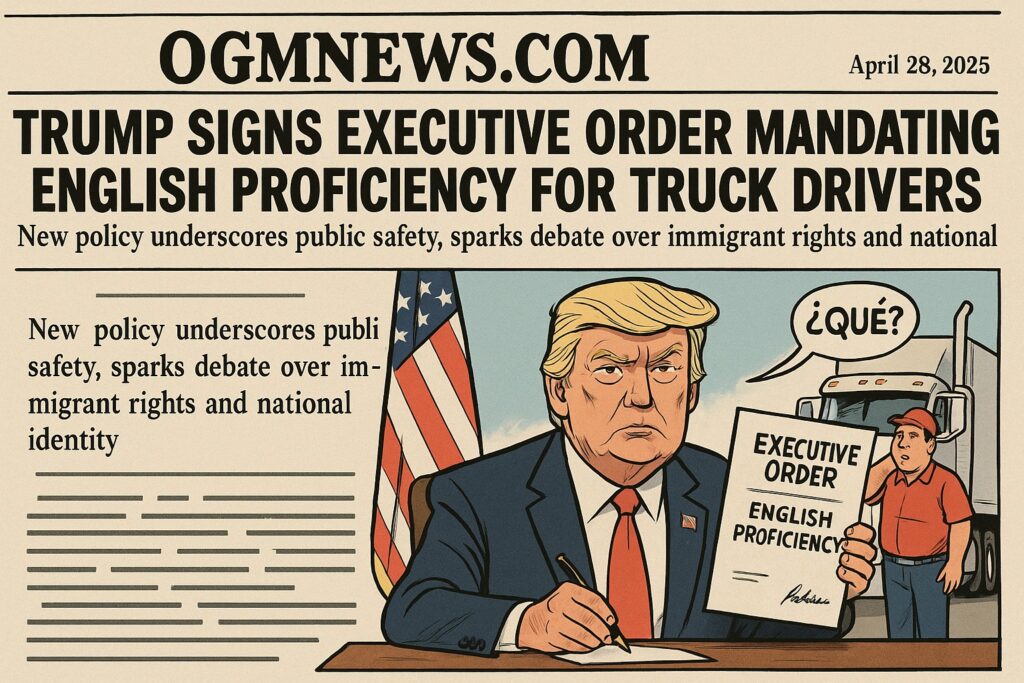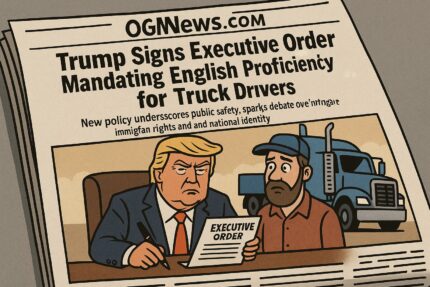Truck Drivers : On April 28, 2025, President Donald Trump signed an executive order mandating the strict enforcement of existing federal rules that require commercial truck drivers to demonstrate English language proficiency. This executive directive revives and prioritizes regulations that have been on the books for years but, according to the administration, have not been consistently applied.
Under the order, commercial drivers must prove their ability to read and speak English well enough to converse with the general public, understand road signs and signals, follow directions from law enforcement, and complete required documentation such as inspection reports and accident forms. This move directly impacts the qualifications necessary for acquiring or maintaining a Commercial Driver License (CDL) in the United States.
Public Safety and Language Clarity: The Administration’s Rationale
Truck Drivers : Citing public safety as a key motivator, the Trump administration has defended the executive order as a necessary measure to prevent miscommunication on the roadways. The administration claims that inconsistent enforcement of English proficiency rules in recent years has led to increased misunderstandings between drivers, officials, and the public, contributing to unsafe driving conditions.
Officials argue that truck drivers who are unable to comprehend English place themselves and others at risk. For example, they may misinterpret critical warning signs or emergency instructions. By reinstating rigorous language enforcement, the administration hopes to reduce accident rates and ensure smoother communication between drivers and authorities across all states.
Industry Reaction: Support from Trucking Groups

Truck Drivers : Several transportation organizations have voiced support for the executive order, with the Small Business in Transportation Coalition (SBTC) at the forefront. In March 2025, the SBTC proposed the Standards Affirming Fluency in English (SAFE) Motor Carrier Act, which aligns closely with Trump’s directive and pushes for mandatory language testing as part of the CDL process.
The SBTC asserts that the measure not only promotes safety but also protects the professional standards of American drivers. By enforcing English standards, the coalition believes that regulatory consistency and accountability within the industry will improve. Additionally, the group supports penalizing carriers who fail to comply, including issuing out-of-service orders for non-compliant drivers.
Truck Drivers : Civil Rights and Immigration Advocates Push Back
Not all groups welcomed the executive order. Civil rights organizations and immigration advocacy groups raised concerns about the potentially discriminatory effects of the policy. Critics argue that the move may disproportionately harm immigrant communities, many of whom work in the trucking sector and are still developing English language skills.
Some advocacy groups warn that the order could be used to justify biased enforcement or deny qualified individuals the opportunity to work. “This policy threatens to marginalize hard-working immigrants who contribute significantly to our economy,” said one representative from a civil liberties organization. Others note that the policy lacks adequate provisions for language support or transitional assistance.
The Political Message: English as a National Unifier
The executive order is part of a broader cultural and political initiative by President Trump to reaffirm English as a core element of American identity. In March 2025, he signed a separate order designating English as the official language of the United States—rolling back previous mandates requiring federal agencies to offer multilingual services.
While that order does not outright ban the use of other languages in government services, it encourages a shift toward English-centric communication to promote “unity, integration, and shared national values.” The trucking language order, therefore, fits neatly within this wider narrative aimed at reinforcing national cohesion through a common tongue.
Truck Drivers : Legal and Constitutional Implications Under Review
Legal experts are already weighing the constitutional implications of the order. Although the English proficiency requirement is not new, the aggressive enforcement and political framing around it may prompt challenges in federal court, especially if individuals are denied employment or certification on grounds that appear discriminatory.
Employment law analysts note that while employers can require job-related language skills, they must ensure that such standards do not unfairly exclude workers based on national origin. The implementation and enforcement of this executive order will likely be closely monitored for compliance with Title VII of the Civil Rights Act, which prohibits workplace discrimination.
Truck Drivers : Road Safety vs. Equity in Employment
The order reignites a long-standing debate between ensuring safety and upholding fairness in employment. Proponents maintain that the measure is a practical necessity to improve highway safety and prevent tragic accidents linked to language barriers. Critics insist that more inclusive strategies—such as federally funded English training programs—could address safety without marginalizing immigrant workers.
As implementation rolls out across federal and state agencies, questions remain about how the new emphasis on English proficiency will be enforced and whether it will withstand legal and political scrutiny. For now, the nation’s truckers—and the industries that depend on them—are navigating both literal and figurative roadblocks in the wake of this controversial directive.














